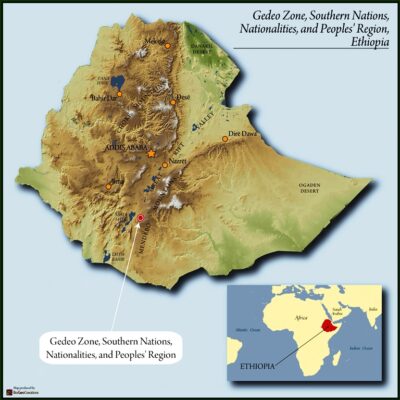ETHIOPIA YIRGACHEFFE 1 NATURAL ORGANIC WORKA SAKARO – HIRBE GASHA – 29084-1 – GrainPro Bags – SPOT RCWHSE
Position Spot
Bags 0
Warehouses Oakland
Flavor Profile Plum, lemon/lime, melon, brown sugar, juniper
Please Note This coffee landed more than 8 months ago.
Check out our Guide to Ethiopian Coffee Grades
Out of stock
About this coffee
Grower
Hirbe Gasha
Altitude
2050 masl
Variety
Regional cultivar 74110 & 74112
Soil
Vertisol
Region
Gedeb District, Gedeo Zone, Southern Nations, Nationalities, and Peoples' Region, Ethiopia
Process
Full natural and dried on raised beds
Harvest
Regional landraces 74110 & 74112
Certification
Organic
Coffee Background
Hirbe Gasha grows coffee on his 8.3-hectare farm in the Worka Sakaro community, located in the south-eastern corner of the coveted Gedeo Zone-- the narrow section of plateau dense with savvy farmers whose coffee is known as “Yirgacheffe”. This more remote corner of the Gedeo plateau centers its commerce around the trading city of Gedeb, a bustling outpost that links commerce between Gedeo and Guji zones, and, it must be mentioned, produces some of the most beautifully perfumed and candy-like natural coffees one can find in all of Ethiopia. The communities surrounding Gedeb reach some of the highest growing elevations for coffee in the world and are a truly enchanting part of the long drive into Guji. In addition to coffee Hirbe grows common subsistence and local market crops like beans and peas.
Coffee has been in Hirbe’s family for many generations. He received a portion of coffee farmland from his father and expanded it himself over time to its current size. This is the first year we have featured Hirbe’s coffee. Coffee is Hirbe’s main source of income that he uses to support his family, and his 37 employees during harvesttime for picking, processing, and milling logistics. Ripe cherries for this natural processed coffee were carefully hand sorted and floated to remove less dense coffee beans before drying on raised beds for 15-21 days. Beds are carefully constructed to ensure proper air circulation and temperature control, and throughout the drying process cherries are stirred multiple times per day for optimal air exposure. Drying cherries are also often covered during the afternoons—a very characteristic technique of southern Gedeo, where the midday sun is searingly intense.
Hirbe exports his own coffee, something that is becoming increasingly possible for successful small farmers in Ethiopia, but still extraordinarily rare. Which for Hirbe means the rest of the processing work is done at a very small scale: Once the cherries finish drying to the necessary 11 percent moisture on the raised beds, they are stored on the farm in jute bags for the humidity to equilibrate across the batch and for the water activity to settle. The coffee is de-hulled in a nearby processing plant and then hand-sorted for visible defects. Samples are then sent around to buyers, and finally the bulk of the coffee is transported to Addis Ababa, the capital of Ethiopia, to be milled and prepared for export according to agreed-upon specifications.
Changes in the Ethiopian export rules have opened pathways to develop relationships with vertically integrated suppliers. Royal has seized on the opportunity over the past few years to work with emerging small businesses looking to sell their coffee direct. Small producers like Hirbe, prior to having an export license, historically had little choice but to sell to local consolidators representing independent washing stations, or join a regional cooperative.






